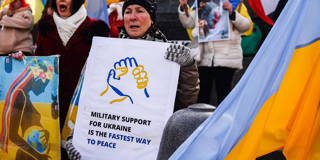The cracks in Russian President Vladimir Putin’s hold on power are beginning to show, largely owing to his botched war in Ukraine. But Ukraine’s allies must focus on increasing military and economic support while avoiding personal attacks on Putin, who could respond by making the war even more brutal and unpredictable.
NEW YORK – The death of Wagner Group leader Yevgeny Prigozhin reveals that Russian President Vladimir Putin has sought to consolidate his power two months after the mercenary’s aborted mutiny threatened his grip on it. Prigozhin’s demise also counters official thinking in the United States about what the mutiny, coming on top of a stalled war in Ukraine, signifies for Putin’s regime.
CIA Director William J. Burns recently said that the uprising showed “signs of weakness” in Putin’s rule, while other analysts noted that it revealed the flexibility of Putin’s red lines. Faced with a direct challenge to his rule, noted Eurasia Group’s Ian Bremmer, Putin did not have Prigozhin immediately executed, but “was cold and calculated and rational … to ensure the survival of his regime.”
Herein lies the dilemma for the US. With cracks in Putin’s authority becoming visible, and with the Russian military divided and demoralized, some experts say now is the time to go “all in” on support for Ukraine, supplying the country with cluster munitions, F-16s, and any other desired military equipment. But the psychology literature on prospect theory shows that when individuals – whether gamblers in a casino or leaders fighting a war of conquest – face setbacks (what researchers call “the domain of perceived losses”), they are more willing to accept undue risk. Moreover, narcissistic autocrats tend not to respond well to personal humiliation.

NEW YORK – The death of Wagner Group leader Yevgeny Prigozhin reveals that Russian President Vladimir Putin has sought to consolidate his power two months after the mercenary’s aborted mutiny threatened his grip on it. Prigozhin’s demise also counters official thinking in the United States about what the mutiny, coming on top of a stalled war in Ukraine, signifies for Putin’s regime.
CIA Director William J. Burns recently said that the uprising showed “signs of weakness” in Putin’s rule, while other analysts noted that it revealed the flexibility of Putin’s red lines. Faced with a direct challenge to his rule, noted Eurasia Group’s Ian Bremmer, Putin did not have Prigozhin immediately executed, but “was cold and calculated and rational … to ensure the survival of his regime.”
Herein lies the dilemma for the US. With cracks in Putin’s authority becoming visible, and with the Russian military divided and demoralized, some experts say now is the time to go “all in” on support for Ukraine, supplying the country with cluster munitions, F-16s, and any other desired military equipment. But the psychology literature on prospect theory shows that when individuals – whether gamblers in a casino or leaders fighting a war of conquest – face setbacks (what researchers call “the domain of perceived losses”), they are more willing to accept undue risk. Moreover, narcissistic autocrats tend not to respond well to personal humiliation.